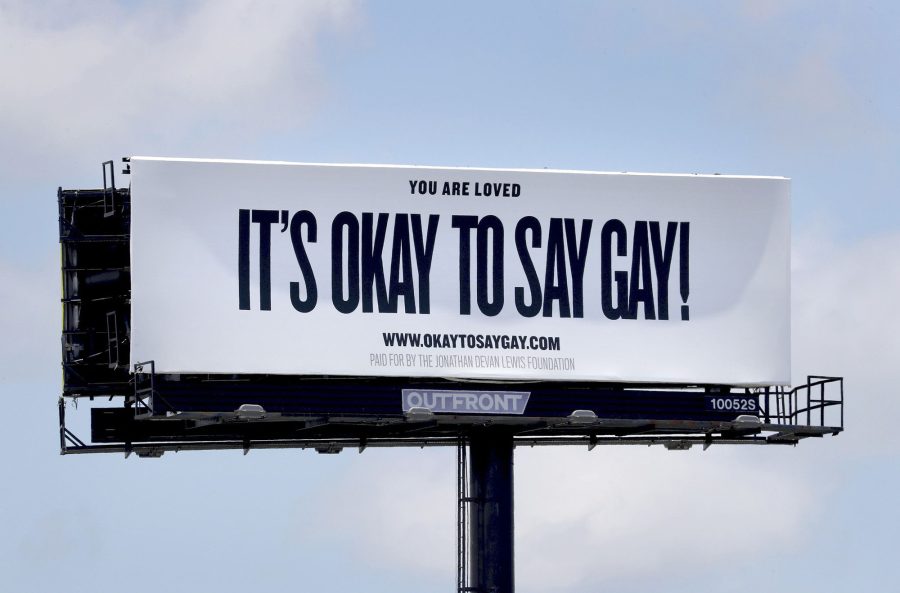Tribune News Service
A billboard along Interstate 95 in Hollywood, Florida, on May 26, 2022, was part of an 80-billboard campaign to combat Florida’s Parental Rights in Education law, labeled “don’t say gay” by critics. Photo courtesy of Mike Stocker/South Florida Sun Sentinel/TNS
Florida enacts three new pieces of anti-LGBTQ+ legislation
Florida has doubled down on anti-LGBTQ+ legislation during the 2023 legislative session, following last year’s passage of House Bill 1557, or better known as the “Don’t Say Gay” law. This year, transgender people were banned from using bathrooms and locker rooms that correspond to their gender, children were banned from attending drag shows and the “Don’t Say Gay” law was expanded.
“I think it is important for schools to educate students on sexual orientation and gender identity,” junior Imran Baig said. “This is because it teaches younger people to accept people at an early stage rather than learning later.”
HB 1069 expands last year’s “Don’t Say Gay” law in what critics are now dubbing the “Don’t Say They” law. The law limits classroom discussion of sexual orientation and gender identity as before but now includes all grades K-8, where it was previously K-3.
“I think that people should be able to talk about whatever they want and there should not be laws against that,” sophomore Blake Backman said. “No matter what people’s opinions are on the matter, being able to express your thoughts without the constriction of a law is important.”
HB 1069 defines sex in its text as “an immutable biological trait and that it is false to ascribe to a person a pronoun that does not correspond to such person’s sex.” Under this, teachers will no longer be able to ask students their pronouns. The law also takes aim at transgender and non-binary teachers by banning them from telling students their pronouns or title (i.e. Mr./Mrs.) if it does not correspond to their biological sex.
In an effort to again expand parental rights, HB 1069 bans books that depict “inappropriate” or sexual content. A federal lawsuit was filed over this, against Escambia County School District, and aims to return any challenged books back to school shelves.
In addition, allowing children to watch a drag show is now illegal, as SB 1438, also known as the “Protection of Children” law, bans “exposing children to an adult live performance.” Hamburger Mary’s Bar and Grille, a drag bar chain, sued the state of Florida, DeSantis, Florida Department of Business and Professional Regulation Secretary Melanie Griffin, over the law.
“‘Adult live performance’ means any show, exhibition, or other presentation in front of a live audience which, in whole or in part, depicts or simulates nudity, sexual conduct, sexual excitement, or specific sexual activities as those terms are defined…lewd conduct, or the lewd exposure of prosthetic or imitation genitals or breasts,” SB 1438 said.
The American Civil Liberties Union believes the law “include[s] vague language that can be used to attack drag shows and performances even though Florida law already prohibits exposing minors to shows considered sexually explicit or harmful.” However, supporters of the law argue that this is to protect children. A similar law was first passed in Tennessee, though a federal judge blocked the law for being “vague and overly broad.”
Let kids be kids. Protect them from losing their innocence.
— Republican state Rep. Doug Bankson during debate on SB 1438
Lastly, transgender people are banned from using the bathroom and/or locker room that does not correspond to their sex assigned at birth in HB 1521. Bathroom bills were very popular in state governments years ago, particularly following North Carolina’s HB 2’s fiasco where backlash was so severe that brands and touring artists pulled out of North Carolina. The law was ultimately overturned.
While many suspect lawsuits against the new laws to continue, it is unclear their success and only time will tell the future of LGBTQ+-related legislation in Florida.
